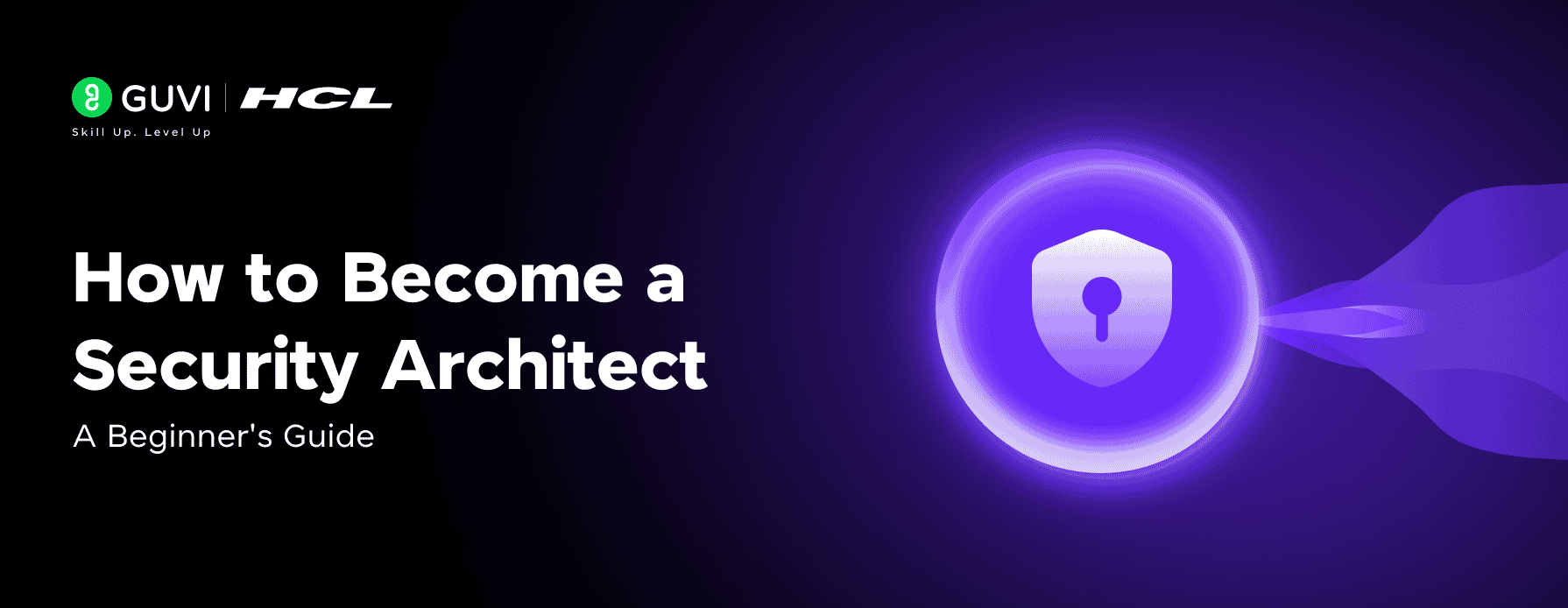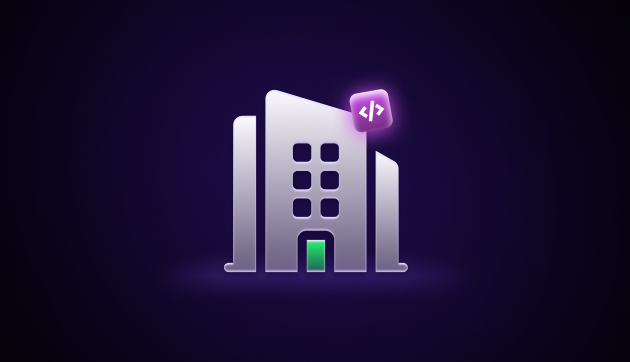
How to Become a Security Architect: A Beginner’s Guide [2025]
Oct 10, 2025 7 Min Read 2217 Views
(Last Updated)
Do you want to build a successful cybersecurity career but don’t know where to start? Well, you’re at the right place because I’m about to discuss one such career choice in detail. Now, if you’re wondering how to become a security architect, you’re looking at a profession with exceptional growth potential.
The security architect career path typically requires 5-10 years of experience in IT with a focus on cybersecurity. This is not an entry-level position. To succeed in this role, you’ll need a broad set of skills, including cloud security, network security, and identity and access management.
Luckily for you, in this article, I will list everything you must know as a beginner about how to become a security architect, from the skills required, education, and certifications to getting your first job. Let’s begin.
Table of contents
- What is a Security Architect?
- Role in an organization
- How do they differ from other cybersecurity roles?
- Skills You Need to Become a Security Architect
- Technical skills: networking, cloud, scripting
- Soft skills: communication, problem-solving, leadership
- Education and Certifications Required to Become a Security Architect
- 1) Bachelor's degree options in India
- 2) Top Online Courses
- 3) Popular certifications: CISSP, CISM, CEH
- 4) Do you need a master's degree?
- Gaining Relevant Experience to Become a Security Architect
- 1) Entry-Level Positions
- 2) Career Progression
- Step-by-Step Career Path to Become a Security Architect
- Job Outlook and Salary in India
- Concluding Thoughts…
- FAQs
- Q1. What is the typical career path to become a security architect?
- Q2. What educational qualifications are needed for a security architect role?
- Q3. What is the salary range for security architects in India?
- Q4. Which industries offer the best opportunities for security architects in India?
- Q5. What key skills are essential for a successful security architect?
What is a Security Architect?
A security architect serves as the mastermind behind an organization’s digital fortress. Essentially, this senior-level professional designs and implements robust security systems that safeguard an organization’s information infrastructure against potential threats and vulnerabilities. Unlike entry-level positions, this role requires substantial experience and technical expertise.
![How to Become a Security Architect: A Beginner's Guide [2025] 1 security architect](https://www.guvi.in/blog/wp-content/uploads/2025/06/What-is-a-Security-Architect.jpg)
Role in an organization
Security architects function as strategic defenders within an organization. They develop comprehensive security frameworks that align with business objectives and compliance requirements. Their primary responsibilities include:
- Designing and implementing security architecture frameworks
- Conducting risk assessments and vulnerability analyses
- Developing security policies, procedures, and guidelines
- Collaborating with IT teams to integrate security into system designs
- Evaluating and recommending security technologies
- Leading security audits and compliance assessments
Security architects typically report to the Chief Information Security Officer (CISO) and often lead teams of security specialists. They work closely with various departments, from development teams to executive leadership, ensuring that security considerations are woven into every aspect of the organization’s operations.
Furthermore, these professionals play a crucial role in both defensive and offensive security measures. They not only implement protective systems like firewalls and anti-virus software but also conduct penetration testing to identify potential weaknesses before attackers can exploit them.
How do they differ from other cybersecurity roles?
Security architects differ from other cybersecurity professionals primarily in their scope of responsibility and seniority. Whereas security analysts focus on monitoring systems and responding to incidents, security architects concentrate on designing the overall security structure.
Security architects are generally more senior than security engineers. The main distinction lies in their focus: architects set the vision and strategy for security systems, while engineers determine how to implement that vision practically. In terms of career progression, security engineers often advance into security architecture roles as they gain experience.
Skills You Need to Become a Security Architect
Becoming a successful security architect requires mastering both technical and soft skills. Since this is not an entry-level position, you’ll need to develop a diverse skill set that makes you capable of designing and implementing robust security frameworks for organizations. Let’s explore the essential skills you need to pursue this career path.
![How to Become a Security Architect: A Beginner's Guide [2025] 2 Skills You Need to Become a Security Architect](https://www.guvi.in/blog/wp-content/uploads/2025/06/‘Skills-You-Need-to-Become-a-Security-Architect.jpg)
Technical skills: networking, cloud, scripting
The foundation of a security architect’s expertise lies in their technical capabilities. These professionals must possess in-depth knowledge across several domains:
- Networking: Network security forms the cornerstone of a security architect’s skill set. You must understand network protocols (TCP/IP, DNS, HTTP, SSL), firewall concepts, and intrusion detection/prevention systems (IDS/IPS). Proficiency in configuring virtual networks, implementing secure routing, and establishing robust firewall policies is indispensable for maintaining a secure architecture.
- Cloud: Cloud security has become increasingly important as organizations migrate to cloud platforms. Security architects need expertise in major cloud platforms like AWS, Azure, and Google Cloud. You should master platform-specific security tools and understand shared responsibility models that delineate security roles between cloud providers and clients.
- Scripting: Programming and scripting skills enable you to automate security tasks and implement solutions efficiently. Knowledge of languages like Python, PowerShell, and Bash allows you to write code for task automation. Experience with Infrastructure-as-Code (IaC) tools such as Terraform and AWS CloudFormation helps automate security policy enforcement and resource provisioning.
- Identity and access management: These skills are crucial for protecting data from unauthorized access while ensuring availability for authorized users. This includes implementing appropriate access control mechanisms like Role-Based Access Control (RBAC) and Mandatory Access Control (MAC).
Other important technical competencies include:
- Operating systems knowledge (Windows, Linux, macOS)
- Data protection and encryption methods
- Vulnerability assessment and penetration testing
- Security auditing and compliance
Soft skills: communication, problem-solving, leadership
Although technical skills are vital, soft skills truly differentiate exceptional security architects. These interpersonal capabilities are equally important for success:
- Communication: Communication skills are paramount as security architects must translate complex technical concepts into language that non-technical stakeholders can understand. You’ll need to create clear documentation, draft security policies, and present findings to executives who may not have technical backgrounds.
- Problem-solving: Problem-solving and analytical thinking capabilities allow security architects to identify potential threats and develop effective solutions. You must approach security challenges systematically, breaking complex problems into manageable components.
- Leadership: Leadership and teamwork abilities are essential since security architects often lead teams and collaborate across departments. You’ll need to delegate tasks, coordinate with colleagues, and guide cross-functional teams toward secure implementations.
Developing this comprehensive skill set takes time and deliberate practice. Subsequently, you’ll need to combine education, certifications, and hands-on experience to master these competencies and become a successful security architect.
Education and Certifications Required to Become a Security Architect
Formal education and professional certifications form the foundation of a security architect’s career. Together, they provide you with the structured knowledge and industry validation you need to excel in this specialized field. Let’s discuss the educational requirements and certification pathways specifically for aspiring security architects in India.
![How to Become a Security Architect: A Beginner's Guide [2025] 3 Education and Certifications Required to Become a Security Architect](https://www.guvi.in/blog/wp-content/uploads/2025/06/Education-and-Certifications-Required-to-Become-a-Security-Architect.jpg)
1) Bachelor’s degree options in India
First and foremost, a bachelor’s degree in computer science, information technology, or a related field is required by most employers hiring security architects. After completing your 10+2 with PCM (Physics, Chemistry, Mathematics) subjects, you can pursue several relevant undergraduate programs:
- B.Tech in Cyber Security
- B.Tech in Computer Science
- B.Tech in Information Technology
- B.Tech in Artificial Intelligence
- BSc in Computer Science
Entrance to these programs typically requires clearing examinations such as JEE Main, JEE Advanced, SRMJEE, BIT SAT, or CUET. These undergraduate programs provide the technical foundation needed to begin your journey toward becoming a security architect.
2) Top Online Courses
Enrolling in structured online courses can accelerate your learning and prepare you for both certifications and real-world challenges. Here are three top platforms offering programs relevant for aspiring Security Architects:
- HCL GUVI’s – Cybersecurity Courses: Covers Network Security, Ethical Hacking, Cloud Security, and Security Architecture with hands-on projects and mentorship. Offers certification, multilingual support, and lifetime access. Best suited for beginners to intermediates seeking a practical, industry-focused course.
- Coursera – IBM Cybersecurity Analyst Professional Certificate: A comprehensive program covering network fundamentals, incident response, and compliance through real-world IBM case studies. Flexible, self-paced, and ideal for beginners wanting a broad understanding of cybersecurity.
- EC-Council – Certified Ethical Hacker (CEH) Online Course: Provides in-depth training in ethical hacking techniques and tools, paired with hands-on virtual labs. Prepares learners for the globally recognized CEH certification, suitable for those interested in offensive security and architecture design.
3) Popular certifications: CISSP, CISM, CEH
In addition to formal education, industry certifications significantly enhance your credibility and expertise, and are highly regarded in the cybersecurity industry. Here are three essential certifications that can boost your security architect career:
- CISSP (Certified Information Systems Security Professional): This globally recognized credential is particularly suitable for security architects. It requires passing a 250-question exam and having at least five years of experience in two or more domains of the ISC² Common Body of Knowledge. CISSP holders demonstrate expertise in designing, implementing, and managing cybersecurity programs.
- CISM (Certified Information Security Manager): Offered by ISACA, this certification validates expertise in information security governance, program development, incident management, and risk management. The exam consists of 150 multiple-choice questions to be completed in four hours. CISM certification requires five years of professional information security management experience.
- CEH (Certified Ethical Hacker): This certification from EC-Council validates your understanding of ethical hacking techniques needed to protect networks from malicious attacks. The exam covers 125 multiple-choice questions and requires at least two years of security domain experience. CEH is especially valuable for security architects who need offensive security knowledge.
Other valuable certifications include CompTIA Security+, CCNA (Cisco Certified Network Associate), and CCNP (Cisco Certified Network Professional).
4) Do you need a master’s degree?
While a bachelor’s degree is sufficient for many security architect positions, a master’s degree can certainly provide competitive advantages. According to Cyberseek, 40% of security architects have bachelor’s degrees, yet 60% pursued master’s degrees. This suggests that advanced education is becoming increasingly common in the field.
Master’s programs worth considering include:
- MTech in Cybersecurity
- MTech in Artificial Intelligence
- MTech in Computer Science and Artificial Intelligence
Notably, a master’s degree can sometimes substitute for years of experience. Professionals with master’s degrees may need less experience to obtain jobs as security architects because education can stand in for employment in some cases. As such, if you’re looking to accelerate your career path, pursuing a master’s degree might be a strategic move.
Gaining Relevant Experience to Become a Security Architect
To become a Security Architect, you must build a strong practical experience in IT and cybersecurity roles. This progression typically starts with foundational positions that provide exposure to security systems, networks, and risk management.
![How to Become a Security Architect: A Beginner's Guide [2025] 4 Gaining Relevant Experience to Become a Security Architect](https://www.guvi.in/blog/wp-content/uploads/2025/06/Gaining-Relevant-Experience-to-Become-a-Security-Architect.jpg)
1) Entry-Level Positions
Most candidates begin in roles that develop technical and operational security skills.
Common roles:
- Security Analyst – Monitors security events, manages firewalls, and supports incident response.
- Network Administrator – Maintains networks, manages security configurations, and troubleshoots connectivity.
- Systems Administrator – Oversees servers and systems security, handles patching, and manages user access controls.
Skills gained:
- Networking fundamentals (TCP/IP, VPNs)
- System administration and security
- Use of security tools (firewalls, SIEM)
- Exposure to compliance standards and basic risk assessment
2) Career Progression
After gaining core experience, professionals move into mid-level roles that build specialized expertise and leadership skills.
Next-level roles:
- Security Engineer – Designs and implements security solutions.
- Penetration Tester – Identifies system vulnerabilities through ethical hacking.
- IT Security Consultant – Advises organizations on security strategies and compliance.
Why this matters:
- Broad hands-on experience prepares you to design and evaluate enterprise-level security architectures.
- Exposure to multiple security domains (cloud, network, application) strengthens your ability to manage complex environments.
- Leading projects and working across teams enhances strategic thinking and communication — key skills for a Security Architect.
Step-by-Step Career Path to Become a Security Architect
The journey to becoming a security architect follows a progressive career path that typically spans 5-10 years. Unlike many tech roles, this position requires substantial experience across multiple security domains before you can design and implement enterprise-wide security frameworks. So, you need a proper roadmap to follow.
![How to Become a Security Architect: A Beginner's Guide [2025] 5 Step by Step Career Path to Become a Security Architect](https://www.guvi.in/blog/wp-content/uploads/2025/06/Step-by-Step-Career-Path-to-Become-a-Security-Architect.jpg)
Here is a table that will make understanding the process simpler for you:
| Step | Milestone | Details | Tips | Estimated Timeline |
| 1 | Earn a relevant Bachelor’s degree | Fields: Computer Science, IT, Cybersecurity, Software EngineeringBuilds foundational knowledge in networks, systems, programming, and security principles | Focus on courses in network security, cryptography, and systems administration | 3–4 years |
| 2 | Gain entry-level IT/security experience | Roles: IT Support Specialist, Network Administrator, Security AnalystWork with hardware, software, networks, and basic security tools | Choose roles with exposure to both networking and security management | 1–3 years |
| 3 | Transition to mid-level security roles | Roles: Security Engineer, Security Consultant, Incident Responder, Penetration TesterDesign and implement security measures, conduct assessments, respond to incidents | Develop expertise across network security, application security, and cloud security | 2–5 years |
| 4 | Obtain relevant security certifications | Key certifications: CompTIA Security+, CEH, CISSP, CISM, CCSPDemonstrates advanced knowledge, hands-on skills, and commitment to cybersecurity | Prioritize CISSP and CCSP for architectural and managerial focus | Can be pursued alongside Steps 2–5 (6–18 months per cert) |
| 5 | Gain architecture-related experience | Design secure architectures, develop policies, evaluate new technologies, lead risk management, and advise leadership | Document architectural contributions in your resume and portfolio | 1–3 years (often overlaps with Step 3) |
| 6 | Step into the Security Architect role | Design secure architectures, develop policies, evaluate new technologies, lead risk management, advise leadership | Strengthen communication, leadership, and business acumen | Typically after 5–10 years of total experience |
| 7 (Optional) | Pursue advanced education & specialized certifications | Master’s in Cybersecurity, Information Assurance, or IT ManagementSpecialized certifications: ISSAP, GDSA | Ideal for leadership or niche roles (e.g., Cloud Security Architect, CISO) | 1–2 years |
Job Outlook and Salary in India
In today’s cybersecurity landscape, pursuing a career as a security architect in India offers substantial financial rewards alongside excellent growth prospects. Let’s examine what you can expect regarding compensation, industries, and job opportunities.
![How to Become a Security Architect: A Beginner's Guide [2025] 6 Job Outlook and Salary of a Security Architect in India](https://www.guvi.in/blog/wp-content/uploads/2025/06/Job-Outlook-and-Salary-of-a-Security-Architect-in-India.jpg)
1. Entry-Level Security Architect (1–3 years of experience)
At the early stages, you will typically transition into Security Architect roles after gaining experience in foundational positions such as a security analyst or a network engineer.
Expected Salary Range: ₹8,00,000 to ₹15,00,000 per annum (India)
Entry-level architects may not handle entire security infrastructures alone but contribute by assisting in designing security solutions and implementing smaller-scale security measures under senior supervision.
2. Mid-Level Security Architect (3–7 years of experience)
At this level, you are expected to handle complex systems, design security frameworks, and take ownership of projects with greater autonomy.
Expected Salary Range: ₹15,00,000 to ₹28,00,000 per annum (India)
3. Senior-Level Security Architect (7+ years of experience)
Senior Security Architects oversee organization-wide security strategies, lead teams, and often advise executive leadership on risk management and compliance.
Expected Salary Range: ₹30,00,000 to ₹50,00,000+ per annum (India)
At this level, many also move into specialized roles such as Chief Information Security Officer (CISO), which can command even higher salaries.
Concluding Thoughts…
As we conclude, I’m sure you know now that becoming a security architect undoubtedly presents an attractive career opportunity for technology professionals in India. Throughout this guide, we’ve explored how this senior-level position offers substantial financial rewards, with average salaries ranging from ₹16.5 lakhs to ₹30 lakhs annually.
While this isn’t an entry-level position, the path to becoming a security architect follows a clear progression. Initially, you’ll need to build foundational IT experience through roles like a security analyst or a network administrator. Subsequently, you can advance to mid-level security positions before reaching the architect level. During this journey, obtaining key certifications such as CISSP, CISM, and CEH will significantly strengthen your credentials.
Although this career demands significant time investment and continuous learning, the rewards—both professional and financial—make it worthwhile for those passionate about cybersecurity.
FAQs
Q1. What is the typical career path to become a security architect?
The journey to becoming a security architect usually starts with entry-level IT roles, progresses through mid-level security positions, and requires 5-10 years of experience. Continuous learning, obtaining relevant certifications, and developing both technical and leadership skills are crucial steps along this path.
Q2. What educational qualifications are needed for a security architect role?
A bachelor’s degree in computer science, information technology, or a related field is typically required. While not mandatory, a master’s degree can provide a competitive edge. Relevant certifications like CISSP, CISM, or CEH are highly valued in the industry.
Q3. What is the salary range for security architects in India?
Security architects in India can expect an average annual salary between ₹16.5 lakhs to ₹30 lakhs, with experienced professionals earning up to ₹30.58 lakhs. The total compensation package, including bonuses, can reach approximately ₹24.8 lakhs per year.
Q4. Which industries offer the best opportunities for security architects in India?
The financial services sector offers the highest compensation, followed closely by IT services and consulting, which is the largest employer of security architects. Healthcare/pharmaceutical companies and Business Process Outsourcing (BPO) firms also provide lucrative opportunities.
Q5. What key skills are essential for a successful security architect?
Successful security architects need a combination of technical and soft skills. These include expertise in network security, cloud security, and programming, as well as strong communication, leadership, and problem-solving abilities. The ability to translate complex technical concepts for non-technical stakeholders is particularly valuable.




































Did you enjoy this article?